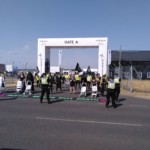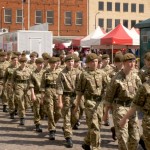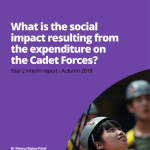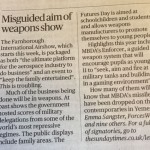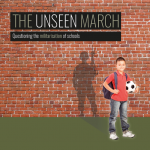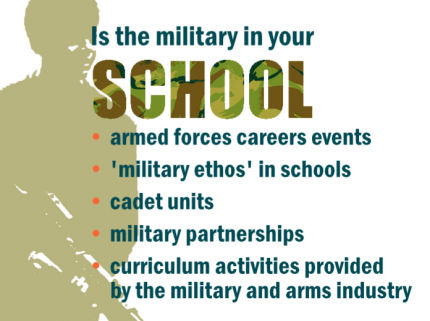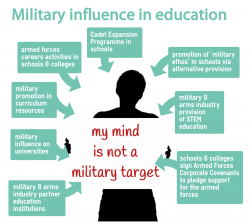 The UK armed forces visit thousands of schools each year. They offer career presentations, curriculum resources and other activities aimed at promoting the interests of the military and long-term recruitment. Since 2012, the Department for Education have promoted ‘military ethos’ programmes such as cadet units in state schools and ‘alternative provision with a military ethos’.
The UK armed forces visit thousands of schools each year. They offer career presentations, curriculum resources and other activities aimed at promoting the interests of the military and long-term recruitment. Since 2012, the Department for Education have promoted ‘military ethos’ programmes such as cadet units in state schools and ‘alternative provision with a military ethos’.
The armed forces and arms companies are increasingly involved in the provision of STEM (science, technology, engineering and maths) activities for school and college students. and they also sponsor a number of careers-led secondary schools. The armed forces also now sponsor youth organisations like Girlguiding and Scouts. See more here.
Should the armed forces by given access to children within education? How can we challenge their activities in schools and colleges? How can a more balanced view of the military be given to young people?
Useful resources
Submission to the Human Rights and the Scottish Parliament inquiry
 This submission made by ForcesWatch and Quakers in Scotland to the Scottish Parliament's human rights inquiry details our concerns around the need for regulation and transparent accountability of military activities in schools, the lack of education about peace and human rights, and the continued recruitment of children into the UK armed forces.
This submission made by ForcesWatch and Quakers in Scotland to the Scottish Parliament's human rights inquiry details our concerns around the need for regulation and transparent accountability of military activities in schools, the lack of education about peace and human rights, and the continued recruitment of children into the UK armed forces.
Take Action on Militarism: website and resource pack
 ForcesWatch have teamed up with Quaker Peace & Social Witness to produce a resource pack to help people take action on militarism in their communities. And there is a website to go with it where you can download the pack or order a hard copy, find links to more resources etc.
ForcesWatch have teamed up with Quaker Peace & Social Witness to produce a resource pack to help people take action on militarism in their communities. And there is a website to go with it where you can download the pack or order a hard copy, find links to more resources etc.
Armed forces visits to schools in Scotland: An update for 2016-2017
Should the military be promoted in schools?
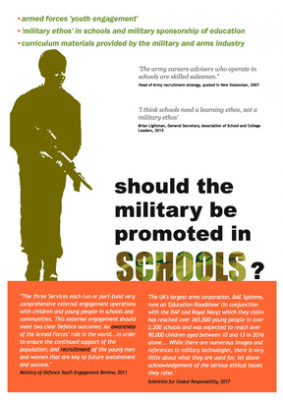 The armed forces have a growing involvement in secondary schools, colleges and even primary schools. While the Army, Navy and RAF have long run activities in schools as part of the Ministry of Defence's Youth Engagement programme, the Department for Education promotes 'military ethos' within education, and parts of the armed forces, along with the arms industry, are developing their involvement with curriculum provision and sponsorship of education institutions. This A4 leaflet (updated 2017) outlines the issue and what the concerns are.
This A4 leaflet (updated 2017) outlines the issue and what the concerns are.
The armed forces have a growing involvement in secondary schools, colleges and even primary schools. While the Army, Navy and RAF have long run activities in schools as part of the Ministry of Defence's Youth Engagement programme, the Department for Education promotes 'military ethos' within education, and parts of the armed forces, along with the arms industry, are developing their involvement with curriculum provision and sponsorship of education institutions. This A4 leaflet (updated 2017) outlines the issue and what the concerns are.
This A4 leaflet (updated 2017) outlines the issue and what the concerns are.
Science for Society
 Science4Society Week is a collection of science education activities, co-ordinated by Scientists for Global Responsibility, and designed to inspire young people. It takes place in March each year.
Science4Society Week is a collection of science education activities, co-ordinated by Scientists for Global Responsibility, and designed to inspire young people. It takes place in March each year.
Rethinking Remembrance in Schools
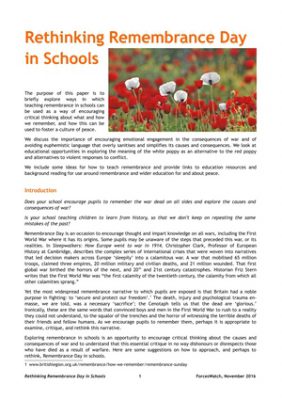 This paper, published by ForcesWatch, explores ways in which teaching remembrance in schools can be used as a way of encouraging critical thinking about what and how we remember, and how this can be used to foster a culture of peace.
This paper, published by ForcesWatch, explores ways in which teaching remembrance in schools can be used as a way of encouraging critical thinking about what and how we remember, and how this can be used to foster a culture of peace.
UN observations on UK and childrens’ rights
Peace education and the promotion of the armed forces in UK schools
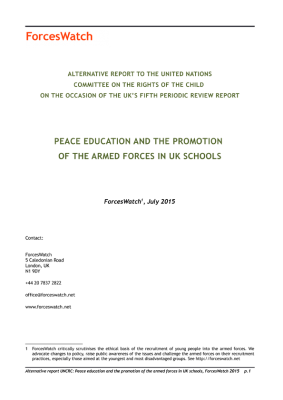 This report highlights that peace education is not being promoted in schools. This is counter to the recommendations made by the United Nations Committee on the Rights of the Child to the UK Government that peace education should be part of the curriculum.
This raises concerns particularly with the increased promotion of the military within schools through the Department for Education's 'military ethos' programme and free military-related learning resources, and as the armed forces continue to conduct a substantial 'youth engagement' programme.
This report highlights that peace education is not being promoted in schools. This is counter to the recommendations made by the United Nations Committee on the Rights of the Child to the UK Government that peace education should be part of the curriculum.
This raises concerns particularly with the increased promotion of the military within schools through the Department for Education's 'military ethos' programme and free military-related learning resources, and as the armed forces continue to conduct a substantial 'youth engagement' programme.
Concerns about armed forces visits to secondary schools in Wales
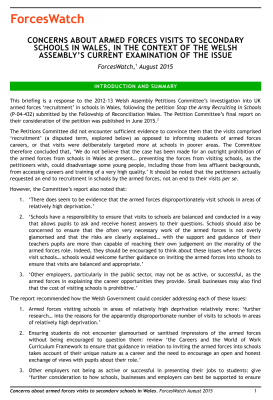 This briefing is a response to the 2012-13 Welsh Assembly Petitions Committee’s investigation into UK armed forces ‘recruitment’ in schools in Wales, following the petition Stop the Army Recruiting in Schools (P-04-432) submitted by the Fellowship of Reconciliation Wales. The Petition Committee’s final report on their consideration of the petition was published in June 2015.
This briefing is a response to the 2012-13 Welsh Assembly Petitions Committee’s investigation into UK armed forces ‘recruitment’ in schools in Wales, following the petition Stop the Army Recruiting in Schools (P-04-432) submitted by the Fellowship of Reconciliation Wales. The Petition Committee’s final report on their consideration of the petition was published in June 2015.
The Unseen March

